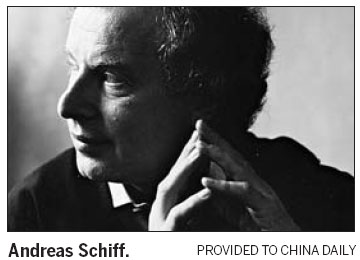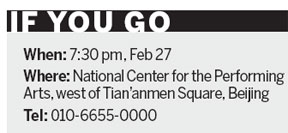Feast of piano music in NCPA's upcoming series

Many instruments, such as the flute or cello, are essentially melodic. For this reason they are usually not played on their own, since we expect harmony as well as melody, and single notes without "chords" can sound incomplete.
But the piano combines both melody and harmony, as symbolized by the notation of its music on two staves showing treble and bass. The piano can go higher than the violin and lower than the double bass.
While this may not be the reason for the piano being one of the most important and popular instruments in the world, its versatility has fascinated all composers to create great music on it. Renowned pianists have shone on the stage for generations.
Today, some 30 million Chinese children are learning to play the piano.
All classical music festivals or concert venues have piano performances on their calendar. The London Southbank Center's International Piano Series has made a name for itself by presenting the greatest piano music performed by both world famous stars and exciting up-and-coming talents every year.
As China's largest theater, the National Center for the Performing Arts (NCPA) has also presented a number of unique piano concerts over the past three years. The Chopin series in 2010 to mark the 200th anniversary of the composer's birth, featuring such big names as Maurizio Pollini and Vladimir Ashkenazy, and young stars such as Wang Yuja and Li Yundi, was both a box-office and popular success.
"We've contacted many top artists and developed a solid regular fan base. We are now ready for our own annual piano series," says Ren Xiaolong, deputy director of NCPA's program department.
Before the Spring Festival, Leon Fleisher's piano recital stunned local audiences with its artistry. On Feb 27, Andreas Schiff who has devoted decades to piano studies, will hold a concert that promises great depth and nuance. It is the maestro's Beijing debut, which local fans have awaited for years.
The Hungarian-born British classical pianist will play Bach's Well Tempered Klavier Book II No 1-1 and Beethoven's Sonatas.
"Schiff is a 'thinker' of piano music. His interpretation is deep. If you've had enough concerts featuring those who just show off their technique, you better not miss this," Liu Xiaolong, critic with the School of Arts of Peking University, says.
Another critic Liu Xuefeng is a big fan of Schiff.
"He is one of the best Bach interpreters. It's a pity I have not heard one of his live concerts. His Bach sounds simple but enduring," Liu Xuefeng says.
"Bach is my God, now and forever," the pianist told Ren and added that Well Tempered Klavier Book is always the first piece that he plays after he gets up in the morning.
Schiff emerged in the 1980s as one of the most respected pianists of his generation. He began to learn the keyboard at 5 and made his debut at 9. At 14, he began formal studies at the Franz Liszt Academy.
The 58-year-old pianist came to international prominence when he won the Tchaikovsky Competition in Moscow in 1974. Over the next few years, he also took top honors at the Leeds (1975) and Liszt International Piano Competition, launching him on a successful concert and recording career.
In April, Gary Graffman, former director of Curtis Institute whose notable students include Lang Lang, Wang Yuja and Zhang Haochen, will perform, and will give a recital in June.

Other highlights of the piano series include the distinguished American pianist Peter Serkin in September, and the lyrical "poet of the piano" Murray Perahia in October.
2011 marks the 200th anniversary of the birth of the Hungarian composer/pianist Franz Liszt. NCPA plans a Liszt series that will see Hungarian pianist Tamas Vasary, French pianist Pierre-Laurent Aimard, and rising talents Li Yundi, Chen Sa and Sun Yingdi perform. In late December, after the 2011 International Franz Liszt Piano Competition held in Utrecht in the Netherlands, NCPA will invite some of the finalists to hold a celebration concert in Beijing.
China Daily
(China Daily 02/18/2011 page20)






















